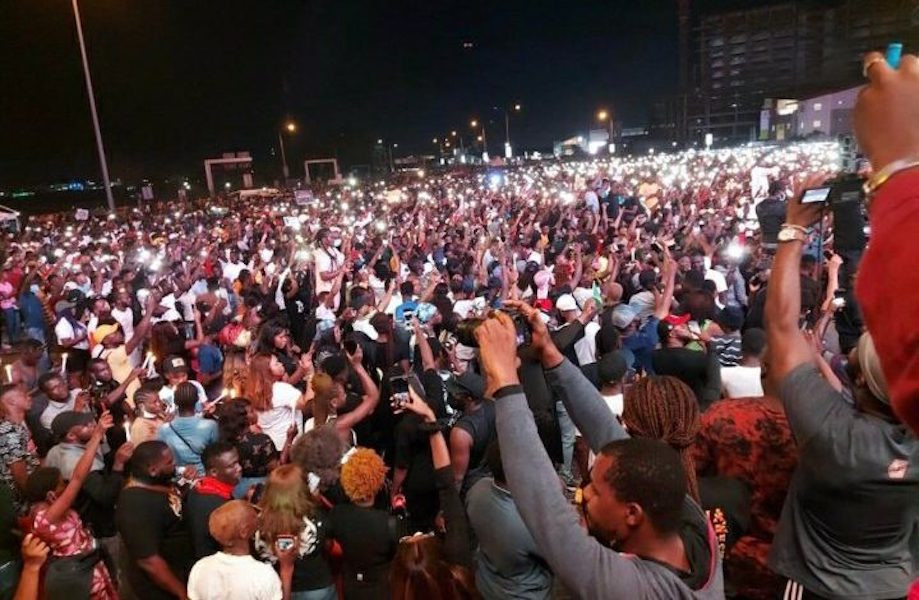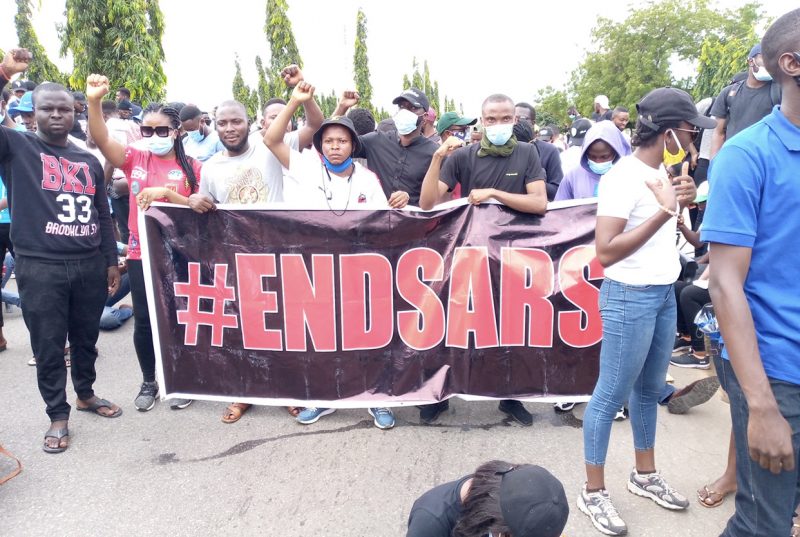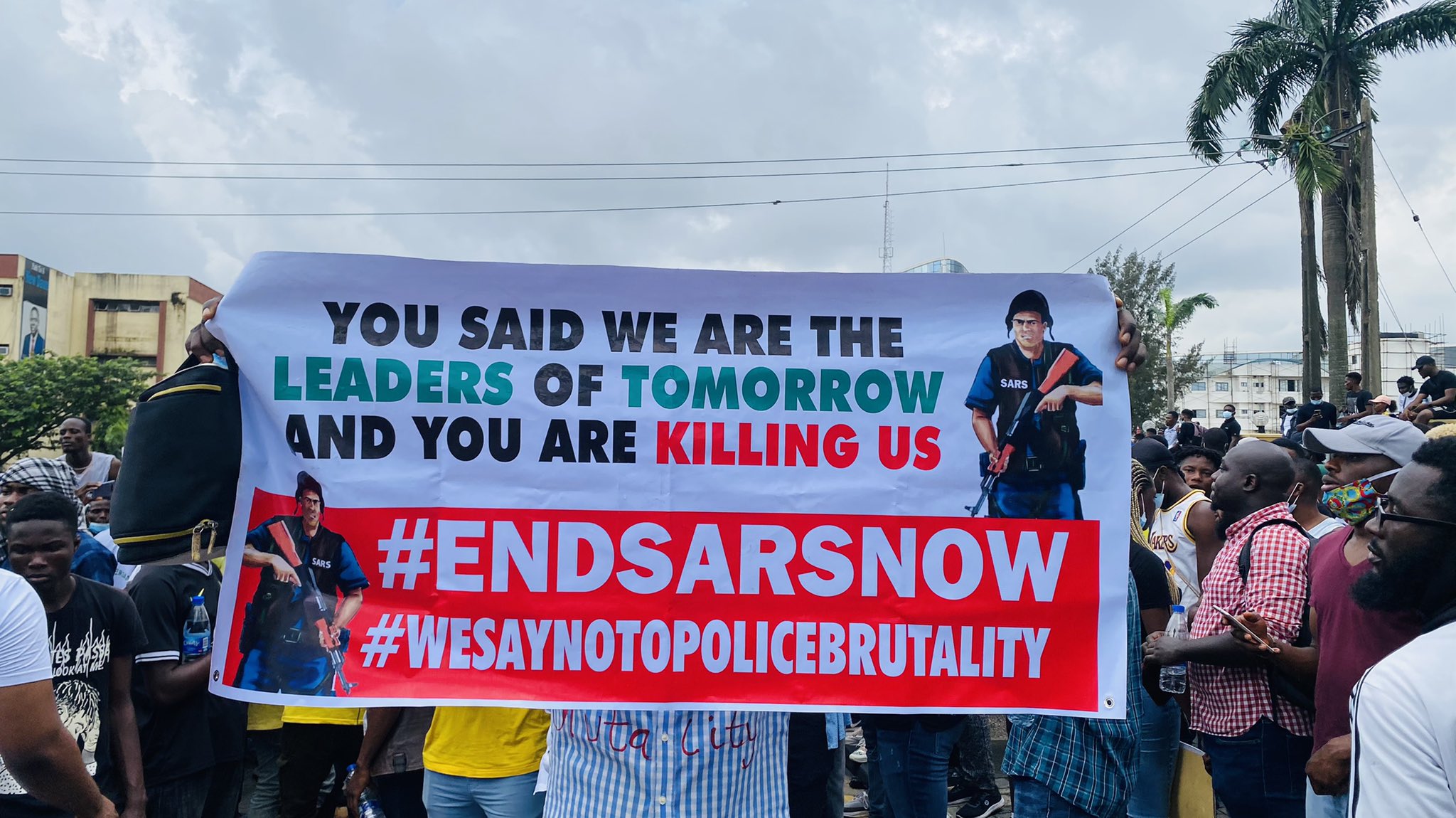Feature/OPED
Preventing Youths Restiveness

By Jerome-Mario Utomi
At about midnight on Thursday, December 31, 2020, Nigerians joined the rest of the world to witness the departure of the year 2020 and within the same space, observed the arrival of the year 2021.
Both events were greeted with an aura of jubilation. However, while I tried like others, to savour the arrival of the New Year and its anticipated promises, the memories of two separate but related events that are Nigeria-specific not only came flooding but gazed on my face.
The first was the shadowy but scary spirit of the #EndSARS protest, particularly the incident of Tuesday, October 20, 2020, at the Lekki tollgate where scores of protesters, according to media reports, were shot as shooters believed to be personnel of the Nigerian military opened fire on hundreds of youths keeping vigil to demand an end to police brutality, an interplay that the world has since agreed was a grievous blunder and a sin both the Lagos state and federal governments will continue to share in its guilt.
The second has to do with the memory of an intervention I made in August 2017, entitled Nigerian youth; celebrated abroad, despised at home.
Refreshing our minds, the piece among other remarks, narrated how a good number of talented Nigeria youths occupy enviable positions at the global stage; back home, disheartening see these same youths of ours helplessly relegated to and made to watch the political and leadership affairs of their nation from the political gallery.
Even as the piece pointed on how political class employs different strategies to ensure that the doors leading to the “power arena” remains perpetually shut against the youths, it submitted that unless something theatrical is done to change the narrative, the nation will continue to ‘lose’ these young Nigerians that will provide the future leadership needs of our nation to countries such as the United States of America (USA), Canada and South Africa.
Unfortunately, about 3 years after that warning signal was dispatched, the nation is still in perpetual search for the most appropriate style for creating rancour-free relationships between the leaders and youths in ways that will render future conflicts unnecessary, just as opinions are heavily divided on whether youths should be allowed to go through the nation’s political leadership apprenticeship.
As an illustration, as a way of forestalling another #EndSARS experience in the country, some have suggested and called on political leaders to develop ‘relationship-oriented leadership style’. To others, especially development professionals, they insist that the best way to averting future resentments by the youths is through the provision of good governance via generation of people-friendly policies, engineering of public leadership apprenticeship for the youths that ‘involves task-orientation, clear leadership objective and creation of shared awareness of dimensions of the task and provide monitoring and feedback’.
Whatever may be the true situation, it is the opinion of this piece that the need to find a solution to youths’ restiveness in the country urgent as they are must be holistic in approach and the most constructive way to achieve this purpose is the adoption of steps that will put the youths in a positive mood.
The reason is obvious. According to a large body of research, people in a positive mood tend to be not only more optimistic but also more forgiving of others and creative in seeking solutions. A positive mode triggers a more accurate perception of others’ argument because people in a good mood tend to relax their defensive barriers and so they can listen more effectively.
From this revelation flows another set of questions.
How can the nation achieve this demand when the present political practice does not engage the best minds in our country to help get the answers and deploy the resources we need to move into the future? When people with networks of influence, their knowledge, and their resources necessary for creating the capacity for shared intelligence that we need to solve the problems are kept out of government?
Certainly, it is glaring from the above that if unleashing our collective productivity, reclaim, revitalize and save the youths from incessant restiveness is part of our objective as a nation, then it again demands more reforms and concrete action from all but more especially from the government; federal, state and local governments alike.
Beginning with the government, we must as a nation recognize that ‘the traditional progressive solution to problems that involve a lack of participation by citizens in civic and democratic processes is to redouble their emphasis on education. And education is, in fact, an extremely valuable strategy for solving many of society’s ills.
In an age where information has more economic value than ever before, it is obvious that education should have a higher national priority. It is also clear that democracies are more likely to succeed when there is widespread access to high-quality education’.
Education alone, however, is necessary but insufficient. A well-educated citizenry is more likely to be a well-informed citizenry, but any education or transformation agenda that does not have job creation at the centre of its programme will take us nowhere. Apart from the reality that unemployment naturally leads to frustration, no nation can have the unemployment challenge similar to what is here in the country without experiencing youth restiveness.
Take the National Bureau of Statistics (NBS) published Q2: 2020 labour statistics as an example. The data revealed that Nigeria’s second-quarter unemployment rate among young people (15-34 years old) was 34.9%, up from 29.7%, while the rate of underemployment for the same age group rose to 28.2% from 25.7% in Q3, 2018.
These rates were the highest when compared to other age groupings. Nigeria’s youth population eligible to work is about 40 million out of which only 14.7 million are fully employed and another 11.2 million are unemployed.
Instead of our political office seekers giving youths arms during electioneering, this should be the time to give the youths work and insist that they work for bread.
What about the family? This is the time for parents to recognize that for a nation to make progress and enjoy relative peace, it must depend on the strength and influence of the family, hard work and respect for elders and love for scholarship and learning to keep the society orderly as these values make for a productive people and help economic growth.
To catalyse the process of enshrining national unity and concord, the time is ripe for the federal government to overtly declare their willingness/resolve to respect human rights and take positive action to facilitate the enjoyment of those rights by her citizens.
Lastly, it is our collective responsibility not to destroy this great nation but to join hands to nurture and sustain it. If we are able to manage this situation and other social menaces effectively and navigate out of dangers of disintegration, it will once again announce the arrival of a brand new great nation where peace and love shall reign supreme.
But if we fail in this direction, it will again render the recent declaration by the presidency that it will no longer allow a repeat of #EndSARS protest experience as gospel without the truth or a mere declaration of intent as no nation enjoys durable peace without justice and stability without fairness and equity.
Jerome-Mario Utomi is the Programme Coordinator (Media and Public Policy), Social and Economic Justice Advocacy (SEJA), Lagos.
Feature/OPED
How Christians Can Stay Connected to Their Faith During This Lenten Period

It’s that time of year again, when Christians come together in fasting and prayer. Whether observing the traditional Lent or entering a focused period of reflection, it’s a chance to connect more deeply with God, and for many, this season even sets the tone for the year ahead.
Of course, staying focused isn’t always easy. Life has a way of throwing distractions your way, a nosy neighbour, a bus driver who refuses to give you your change, or that colleague testing your patience. Keeping your peace takes intention, and turning off the noise and staying on course requires an act of devotion.
Fasting is meant to create a quiet space in your life, but if that space isn’t filled with something meaningful, old habits can creep back in. Sustaining that focus requires reinforcement beyond physical gatherings, and one way to do so is to tune in to faith-based programming to remain spiritually aligned throughout the period and beyond.
On GOtv, Christian channels such as Dove TV channel 113, Faith TV and Trace Gospel provide sermons, worship experiences and teachings that echo what is being practised in churches across the country.
From intentional conversations on Faith TV on GOtv channel 110 to true worship on Trace Gospel on channel 47, these channels provide nurturing content rooted in biblical teaching, worship, and life application. Viewers are met with inspiring sermons, reflections on scripture, and worship sessions that help form a rhythm of devotion. During fasting periods, this kind of consistent spiritual input becomes a source of encouragement, helping believers stay anchored in prayer and mindful of God’s presence throughout their daily routines.
To catch all these channels and more, simply subscribe, upgrade, or reconnect by downloading the MyGOtv App or dialling *288#. You can also stream anytime with the GOtv Stream App.
Plus, with the We Got You offer, available until 28th February 2026, subscribers automatically upgrade to the next package at no extra cost, giving you access to more channels this season.
Feature/OPED
Turning Stolen Hardware into a Data Dead-End

By Apu Pavithran
In Johannesburg, the “city of gold,” the most valuable resource being mined isn’t underground; it’s in the pockets of your employees.
With an average of 189 cellphones reported stolen daily in South Africa, Gauteng province has become the hub of a growing enterprise risk landscape.
For IT leaders across the continent, a “lost phone” is rarely a matter of a misplaced device. It is frequently the result of a coordinated “snatch and grab,” where the hardware is incidental, and corporate data is the true objective.
Industry reports show that 68% of company-owned device breaches stem from lost or stolen hardware. In this context, treating mobile security as a “nice-to-have” insurance policy is no longer an option. It must function as an operational control designed for inevitability.
In the City of Gold, Data Is the Real Prize
When a fintech agent’s device vanishes, the $300 handset cost is a rounding error. The real exposure lies in what that device represents: authorised access to enterprise systems, financial tools, customer data, and internal networks.
Attackers typically pursue one of two outcomes: a quick wipe for resale on the secondary market or, far more dangerously, a deep dive into corporate apps to extract liquid assets or sellable data.
Clearly, many organisations operate under the dangerous assumption that default manufacturer security is sufficient. In reality, a PIN or fingerprint is a flimsy barrier if a device is misconfigured or snatched while unlocked. Once an attacker gets in, they aren’t just holding a phone; they are holding the keys to copy data, reset passwords, or even access admin tools.
The risk intensifies when identity-verification systems are tied directly to the compromised device. Multi-Factor Authentication (MFA), widely regarded as a gold standard, can become a vulnerability if the authentication factor and the primary access point reside on the same compromised device. In such cases, the attacker may not just have a phone; they now have a valid digital identity.
The exposure does not end at authentication. It expands with the structure of the modern workforce.
65% of African SMEs and startups now operate distributed teams. The Bring Your Own Device (BYOD) culture has left many IT departments blind to the health of their fleet, as personal devices may be outdated or jailbroken without any easy way to know.
Device theft is not new in Africa. High-profile incidents, including stolen government hardware, reinforce a simple truth: physical loss is inevitable. The real measure of resilience is whether that loss has any residual value. You may not stop the theft. But you can eliminate the reward.
Theft Is Inevitable, Exposure is Not
If theft cannot always be prevented, systems must be designed so that stolen devices yield nothing of consequence. This shift requires structured, automated controls designed to contain risk the moment loss occurs.
Develop an Incident Response Plan (IRP)
The moment a device is reported missing, predefined actions should trigger automatically: access revocation, session termination, credential reset and remote lock or wipe.
However, such technical playbooks are only as fast as the people who trigger them. Employees must be trained as the first line of defence —not just in the use of strong PINs and biometrics, but in the critical culture of immediate reporting. In high-risk environments, containment windows are measured in minutes, not hours.
Audit and Monitor the Fleet Regularly
Control begins with visibility. Without a continuous, comprehensive audit, IT teams are left responding to incidents after damage has occurred.
Opting for tools like Endpoint Detection and Response (EDR) allows IT teams to spot subtle, suspicious activities or unusual access attempts that signal a compromised device.
Review Device Security Policies
Security controls must be enforced at the management layer, not left to user discretion. Encryption, patch updates and screen-lock policies should be mandatory across corporate devices.
In BYOD environments, ownership-aware policies are essential. Corporate data must remain governed by enterprise controls regardless of device ownership.
Decouple Identity from the Device
Legacy SMS-based authentication models introduce avoidable risk when the authentication channel resides on the compromised handset. Stronger identity models, including hardware tokens, reduce this dependency.
At the same time, native anti-theft features introduced by Apple and Google, such as behavioural theft detection and enforced security delays, add valuable defensive layers. These controls should be embedded into enterprise baselines rather than treated as optional enhancements.
When Stolen Hardware Becomes Worthless
With POPIA penalties now reaching up to R10 million or a decade of imprisonment for serious data loss offences, the Information Regulator has made one thing clear: liability is strict, and the financial fallout is absolute. Yet, a PwC survey reveals a staggering gap: only 28% of South African organisations are prioritising proactive security over reactive firefighting.
At the same time, the continent is battling a massive cybersecurity skills shortage. Enterprises simply do not have the boots on the ground to manually patch every vulnerability or chase every “lost” terminal. In this climate, the only viable path is to automate the defence of your data.
Modern mobile device management (MDM) platforms provide this automation layer.
In field operations, “where” is the first indicator of “what.” If a tablet assigned to a Cape Town district suddenly pings on a highway heading out of the city, you don’t need a notification an hour later—you need an immediate response. An effective MDM system offers geofencing capabilities, automatically triggering a remote lock when devices breach predefined zones.
On Supervised iOS and Android Enterprise devices, enforced Factory Reset Protection (FRP) ensures that even after a forced wipe, the device cannot be reactivated without organisational credentials, eliminating resale value.
For BYOD environments, we cannot ignore the fear that corporate oversight equates to a digital invasion of personal lives. However, containerization through managed Work Profiles creates a secure boundary between corporate and personal data. This enables selective wipe capabilities, removing enterprise assets without intruding on personal privacy.
When integrated with identity providers, device posture and user identity can be evaluated together through multi-condition compliance rules. Access can then be granted, restricted, or revoked based on real-time risk signals.
Platforms built around unified endpoint management and identity integration enable this model of control. At Hexnode, this convergence of device governance and identity enforcement forms the foundation of a proactive security mandate. It transforms mobile fleets from distributed risk points into centrally controlled assets.
In high-risk environments, security cannot be passive. The goal is not recovery. It is irrelevant, ensuring that once a device leaves authorised hands, it holds no data, no identity leverage, and no operational value.
Apu Pavithran is the CEO and founder of Hexnode
Feature/OPED
Daniel Koussou Highlights Self-Awareness as Key to Business Success

By Adedapo Adesanya
At a time when young entrepreneurs are reshaping global industries—including the traditionally capital-intensive oil and gas sector—Ambassador Daniel Koussou has emerged as a compelling example of how resilience, strategic foresight, and disciplined execution can transform modest beginnings into a thriving business conglomerate.
Koussou, who is the chairman of the Nigeria Chapter of the International Human Rights Observatory-Africa (IHRO-Africa), currently heads the Committee on Economic Diplomacy, Trade and Investment for the forum’s Nigeria chapter. He is one of the young entrepreneurs instilling a culture of nation-building and leadership dynamics that are key to the nation’s transformation in the new millennium.
The entrepreneurial landscape in Nigeria is rapidly evolving, with leaders like Koussou paving the way for innovation and growth, and changing the face of the global business climate. Being enthusiastic about entrepreneurship, Koussou notes that “the best thing that can happen to any entrepreneur is to start chasing their dreams as early as possible. One of the first things I realised in life is self-awareness. If you want to connect the dots, you must start early and know your purpose.”
Successful business people are passionate about their business and stubbornly driven to succeed. Koussou stresses the importance of persistence and resilience. He says he realised early that he had a ‘calling’ and pursued it with all his strength, “working long weekends and into the night, giving up all but necessary expenditures, and pressing on through severe setbacks.”
However, he clarifies that what accounted for an early success is not just tenacity but also the ability to adapt, to recognise and respond to rapidly changing markets and unexpected events.
Ambassador Koussou is the CEO of Dau-O GIK Oil and Gas Limited, an indigenous oil and natural gas company with a global outlook, delivering solutions that power industries, strengthen communities, and fuel progress. The firm’s operations span exploration, production, refining, and distribution.
Recognising the value of strategic alliances, Koussou partners with business like-minds, a move that significantly bolsters Dau-O GIK’s credibility and capacity in the oil industry. This partnership exemplifies the importance of building strong networks and collaborations.
The astute businessman, who was recently nominated by the African Union’s Agenda 2063 as AU Special Envoy on Oil and Gas (Continental), admonishes young entrepreneurs to be disciplined and firm in their decision-making, a quality he attributed to his success as a player in the oil and gas sector. By embracing opportunities, building strong partnerships, and maintaining a commitment to excellence, Koussou has not only achieved personal success but has also set a benchmark for future generations of African entrepreneurs.
His journey serves as a powerful reminder that with determination and vision, success is within reach.
-

 Feature/OPED6 years ago
Feature/OPED6 years agoDavos was Different this year
-
Travel/Tourism10 years ago
Lagos Seals Western Lodge Hotel In Ikorodu
-

 Showbiz3 years ago
Showbiz3 years agoEstranged Lover Releases Videos of Empress Njamah Bathing
-

 Banking8 years ago
Banking8 years agoSort Codes of GTBank Branches in Nigeria
-

 Economy3 years ago
Economy3 years agoSubsidy Removal: CNG at N130 Per Litre Cheaper Than Petrol—IPMAN
-

 Banking3 years ago
Banking3 years agoSort Codes of UBA Branches in Nigeria
-

 Banking3 years ago
Banking3 years agoFirst Bank Announces Planned Downtime
-

 Sports3 years ago
Sports3 years agoHighest Paid Nigerian Footballer – How Much Do Nigerian Footballers Earn


















